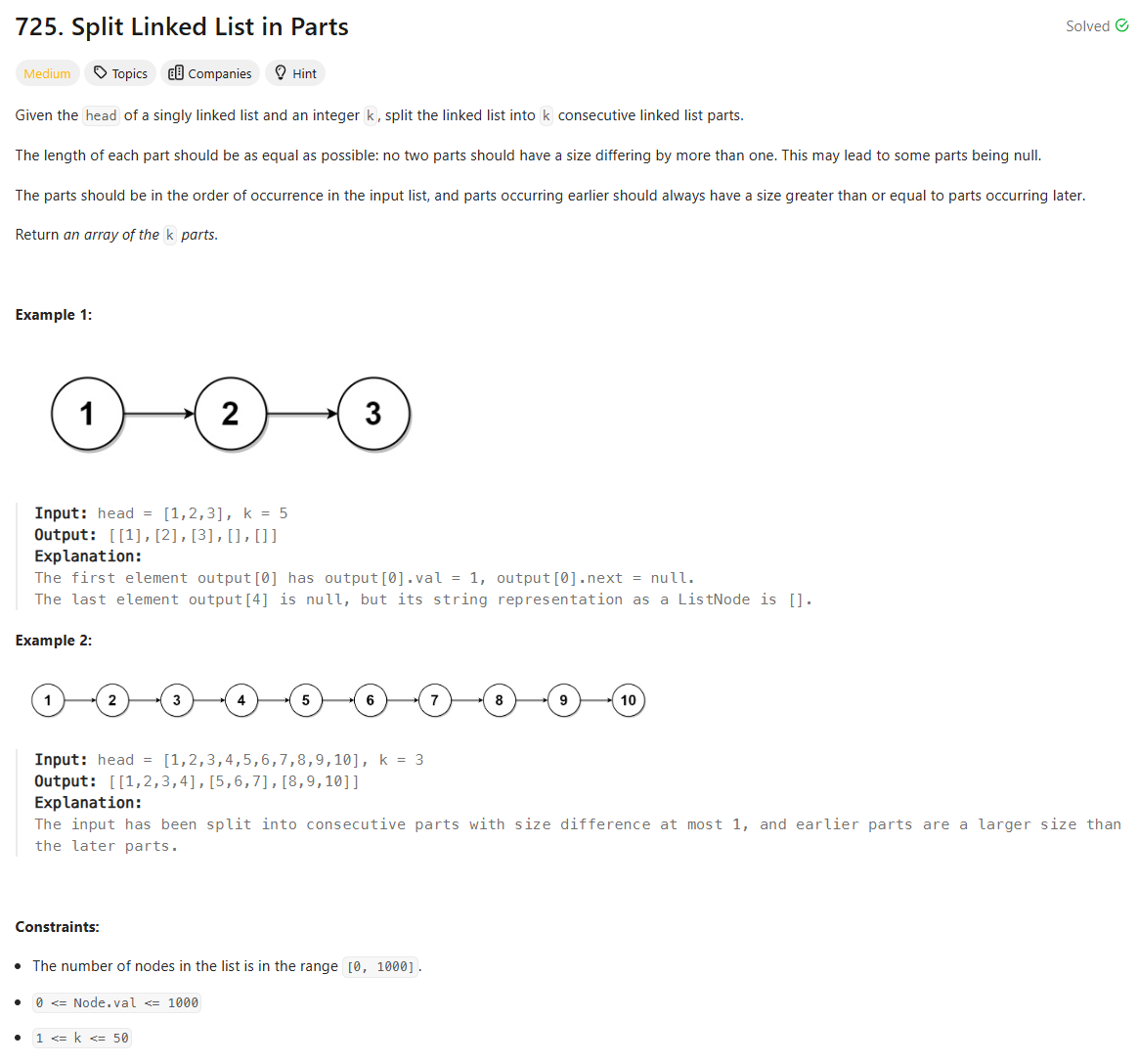Problem of The Day: Split Linked List in Parts
Problem Statement

Intuition
To split the list into k parts, we need to first determine the total length of the linked list. Once the length is known, we can calculate the number of elements that should go into each part. The first remainder parts will contain an extra node to evenly distribute the nodes.
Approach
- Traverse the linked list to determine its total length.
- Compute the number of nodes each part should have by dividing the total length by
k. Also, determine how many extra nodes should be distributed among the first few parts. - Iterate through the list, breaking it into parts of the appropriate sizes, and collect them in the result list.
Complexity
-
Time complexity: \(O(n)\) because we traverse the linked list twice: once to find its length and once to split it into parts.
-
Space complexity: \(O(k)\) for storing the result in the array of
kparts.
Code
# Definition for singly-linked list.
# class ListNode:
# def __init__(self, val=0, next=None):
# self.val = val
# self.next = next
class Solution:
def splitListToParts(self, head: Optional[ListNode], k: int) -> List[Optional[ListNode]]:
length = 0
curr = head
while curr:
length += 1
curr = curr.next
each_list_len = length // k
remaining = length % k
list_len = [each_list_len] * k
for i in range(remaining):
list_len[i % k] += 1
curr = head
res = []
prev = None
for i in range(k):
curr_len = list_len[i]
res.append(head)
while curr_len and head:
curr_len -= 1
prev = head
head = head.next
if prev:
prev.next = None
return res
Editorial
Approach 1: Create New Parts
class Solution:
def splitListToParts(
self, head: Optional[ListNode], k: int
) -> List[Optional[ListNode]]:
ans = [None] * k
size = 0
current = head
while current is not None:
size += 1
current = current.next
split_size = size // k
num_remaining_parts = size % k
current = head
for i in range(k):
new_part = ListNode(0)
tail = new_part
current_size = split_size
if num_remaining_parts > 0:
num_remaining_parts -= 1
current_size += 1
for j in range(current_size):
tail.next = ListNode(current.val)
tail = tail.next
current = current.next
ans[i] = new_part.next
return ans
- time: O(n)
- space: O(n)
Approach 2: Modify Linked List
class Solution:
def splitListToParts(
self, head: Optional[ListNode], k: int
) -> List[Optional[ListNode]]:
ans = [None] * k
# get total size of linked list
size = 0
current = head
while current is not None:
size += 1
current = current.next
# minimum size for the k parts
split_size = size // k
# Remaining nodes after splitting the k parts evenly.
# These will be distributed to the first (size % k) nodes
num_remaining_parts = size % k
current = head
prev = current
for i in range(k):
# create the i-th part
new_part = current
# calculate size of i-th part
current_size = split_size
if num_remaining_parts > 0:
num_remaining_parts -= 1
current_size += 1
# traverse to end of new part
j = 0
while j < current_size:
prev = current
if current is not None:
current = current.next
j += 1
# cut off the rest of linked list
if prev is not None:
prev.next = None
ans[i] = new_part
return ans
- time: O(n)
- space: O(1)